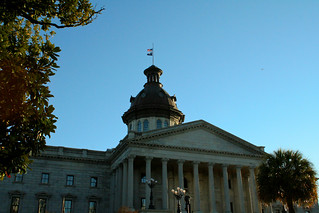We retired Tax Justice Blog in April 2017. For new content on issues related to tax justice, go to www.justtaxesblog.org
We’ve long advocated for taxes that have a broad base. Tax structures that abide by this principle don’t pick winners and losers and, importantly, they keep revenues more stable in the long run. In South Carolina earlier this week, a House subcommittee took a positive step in this direction when it voted to eliminate several exemptions to the sales tax, including the sales tax holidays for guns and back-to-school purchases. The increased revenues would allow an overall reduction in the sales tax rate.
But when the legislation went to the full House Ways  and Means Committee, it was amended. Instead of the $250 million worth of exemptions the original bill contained, the amended version only returns about $15 million in revenues to the state’s budget.
and Means Committee, it was amended. Instead of the $250 million worth of exemptions the original bill contained, the amended version only returns about $15 million in revenues to the state’s budget.
Among the unwise exemptions restored were the two sales tax holidays, which do little to help the taxpayers they’re supposed to help and don’t seem to boost local economies, either. The Republican sponsor of the original legislation, Rep. Tommy Springer, said of sales tax holidays, “We researched tax analysis, tax reports and the evidence does not suggest they actually save money.” But as an astute Carolinian told the local news, had they ended those holidays, even if it meant a lower year round tax rate, “I don’t think your typical citizen is going to see it as anything other than taking something away from them, because they’ve become accustomed to it.”
Though the bill has been pared back considerably, Springer is hopeful that a fundamental piece of the legislation will be approved: the requirement that any sales tax exemptions be automatically re-evaluated every five years. Mandating evaluation of tax expenditures is a good idea; too often these loopholes become permanent features of budgets – and sources of deficits – long after their usefulness has passed. They aren’t the same as real tax reform that broadens the base and lowers the rate, but the transparency they afford helps build the case for progressive reform.
Photo of South Carolina State House via Richard Boltin Creative Commons Attribution License 2.0